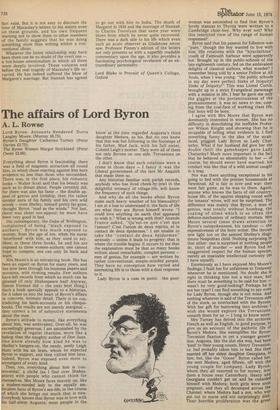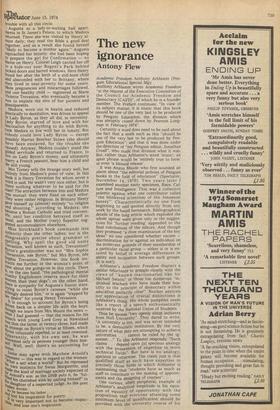The affairs of Lord Byron
A. L. Rowse
Lord Byron. Accounts Rendered Doris Langley Moore. (Murray £6.75).
Byron's Daughter Catherine Turney (Peter Davies £3.75).
The Byron Women Margot Strickland (Peter Owen £3.60).
Everything about Byron is fascinating: there was a field of magnetic attraction all round him, to which those reacting against him bore evidence no less than those who succumbed. There was, in the first place, his romantic looks — Walter Scott said that his beauty was such as to dream about. People certainly did, for there was also his fame — the double ap peal of genius and lordship; then the rather sinister aura of his family and his own wild streak — even Shelley, himself pretty far gone, thought Byron "mad as the winds." Not last, there was sheer sex-appeal: he must have been very good in bed.
His contemporary, the Duke of Wellington, 'complained of being "much exposed to authors;" Byron was much exposed to women, from the age of ten, when his nurse Interfered' with him, as they used to say. Here, in these three books, he and his are exposed to three women-authors; one cannot hope to compete, one can only lie back and learn.
Mrs Moore's is an entrancing book. She has been an expert on Byron for many years, and has now been through his business papers and accounts, with riveting results. Few authors have left records from which so much can be gleaned (if only Shakespeare had! Anyway, Simon Forman did — the next best thing.) Such a book specially appeals to a historian, for it takes us into the heart of Byron's affairs in concrete, intimate detail. There is no contradicting his bank-accounts or his chequebooks. The results are not merely marginal — they correct a lot of subjective statements about the man.
Byron's attitude to money, like everything about him, was ambivalent. Over-all, he was exceedingly generous; I am astonished by the revelation of regular charities, more like a bishop than the naughty author of Don Juan. One knew already how kind he was to Shelley's hangers-on, the needy, seedy Leigh Hunt with his six brats, whom he expected Byron to support, and then vilified him later. Indeed, Byron was exposed even more to scroungers of every kind.
Then, too, everything about him is 'controversial,' a cliche (as I find over Shakespeare) with people who cannot think for themselves. Mrs Moore faces bravely up, like a modern-minded lady to the equally ambivalent facts of Byron's sex-life, in the course of which she brings out much that is new. Everybody knows that Byron was in love with his half-sister Augusta; most people in the
know at the time regarded Augusta's third daughter Medora, as his. But no one knew that this was but following in the footsteps of his father, Mad Jack, with his full sister, Colonel Leigh's mother. They were all of them not only Byrons on one side, Trevanions on the other.
I don't know that such relations were a crime in those days — I fancy it was the Liberal government of the late Mr Asquith that made them so.
Any historian familiar with parish records, anybody who has lived cheek-by-jowl in the delightful intimacy Of village-life, will know the frequency of such things.
And why do all the books about Byron make such heavy weather of his bisexuality?
I am at a loss to understand it: the facts of life are what they are. Byron himself wrote: "I could love anything on earth that appeared to wish it." What is wrong with that? Anatole France asked, "Qu'est-ce que c'est que l'amour? C'est l'union de deux esprits, et le contact de deux epidermes." I am unable to take the "contact de deux epidermes" seriously — unless it leads to progeny: that is where the trouble begins. It occurs to me that the explanation must be that so many books written about remarkable, complex persons — men of genius, for example — are written by rather conventional, simple-minded people. They have no conception how varied and interesting life is to those with a dual response to it.
Lady Byron is a case in point: the poor woman was astonished to find that Byron's lovely stanzas to Thyrza were written to a Cambridge choir-boy. Why ever not? Why this restricted view of the range of human responses?
Byron said that his passion for Edleston was "pure," though the boy wanted to live with him. His relations with the "hyacinthine" youth of Falmouth harbour were apparently not. Brought up in the public-schools of the late eighteenth century, fed on the ambivalent delights of classical authors, what wonder? I remember being told by a senior Fellow at All Souls, when I was young: "the public schools in my day were perfect Sinks of Iniquity! Sinks of Iniquity!" This was Lionel Curtis, brought up in a strict Evangelical parsonage with a mission in life. I fear he gave me only the giggles at the portentousness of the pronouncement: it was no news to me, coming from the coal-face of working class life, that boys will be boys.
I agree with Mrs Moore that Byron was dominantly interested in women. She has no difficulty in demolishing the ineffable Professor Wilson Knight and showing that he is incapable of telling what evidence is. I find something funny in the idea of the straitlaced, priggish Lady Byron as Lady Chatterley. What if her husband did give her the double thrill the gameke.eper gave Lady Chatterley? Much more important is the fact that he behaved so abominably to her — of course, he should never have married: his conduct was like that of a wild animal caught in a trap.
Nor was there anything exceptional in his going to bed with the prettier housemaids at Newstead. All is fair in love and war: they were fair game, as he was to them. Again, anyone who knows the facts of old countryhouse life, of the squires sleeping round with the tenants' wives, will not be surprised. The difference was mainly that Byron, a man of genius, was totally without humbug, the coating of slime which is so often the defence-mechanism of ordinary mortals. Mrs Moore several times draws attention to Byron's outspokenness, his candour — the expressiveness of the born writer. She throws new light too on the sainted Shelley's illegitimate Neapolitan child. Nothing surprising in that either: one is surprised at nothing people do, short of murder — and Byron had no exaggerated respect for the human species, merely an insatiable intellectual curiosity (as I have myself). Enormously as I have enjoyed Mrs Moore's findings, I fault her for unfairness to TrelawnY whenever he is mentioned. No doubt she is right in thinking him not a nice man; but there must be something to be said for him — wasn't he very good-looking? Perhaps he is not her type? I can find something to say even for Lady Byron, though she is not mine. And nothing whatever is said of the Trevanion side of the stock, so interlocked with the Byrons. With her gift for burrowing into archives, I wish she would explore the Trevanions, unearth them for us — I long to know more. Mrs Turney has delved into the archives. French as well as English, to good purpose, to give us an account of the pathetic life of Byron's Medora. She exemplifies the Byron' Trevanion fixation in yet a younger generation. Augusta, like the slut she was, had been 'kind' to their young cousin, Henry Trevanion, i.e. had probably taken him to bed. She then married off her eldest daughter Georgiana. t° him; but, like the "Goose" Byron called her, she sent Medora, aged fifteen, off with the young couple for company. Lady Byron, whom they all resorted to for money, lent them a house near Canterbury. Henry and Georgiana couldn't get on and he consoled himself with Medora; both girls were soon pregnant, and they all decamped across the Channel, where Medora had a son, who was put out to nurse and not surprisingly died. Their horrible proliferation was the great
Augusta as a lady-in-waiting had apartments in St James's Palace, to which Medora returned. There she was visited by Henry almost daily; they read the Bible a good deal together, and as a result she found herself "likely to become a mother again." Augusta reproached her bitterly: she had been hoping to prepare the girl for Confirmation — no blame on Henry. Colonel Leigh carried her off to a hide-out near Regent's Park behind locked doors and barred windows. Here Henry found her after the birth of a still-born child and absconded with her to Brittany, where they lived in near-poverty for some years. More pregnancies and miscarriages followed, and one healthy child — registered as Marie Violette Trevanion, who eventually became a nun to expiate the sins of her parents and grandparents. Medora, worn out in health and reduced Practically to destitution, was driven to appeal to Lady Byron, as they all did, in extremity. Lady Byron, starved of love and with her fascination for anything to do with Byron, took Medora to live with her in luxury. But nobody could love Lady Byron — except Possibly Harriet Beecher Stowe (she should have been enslaved, for the ttouble she caused). Anyway, Medora couldn't stand the gilded servitude and returned to France, to live on Lady Byron's money, and ultimately marry a French peasant, bear him a child and cite still young. Mrs Turney tells the strange story well, but entirely from Medora's point of view; in this boOk it is Henry Trevanion for whom never a Word is said. He wasn't very nice either, but is there nothing whatever to be said for the 'flan? The attraction between him and Medora
s mutual: they were fixed on each other. 'neY were rather religious. In Brittany Henry gave himself up (almost) entirely "to religion and shooting," according to Medora; she 1:).ecame a Roman Catholic and tried conventhe,, until her condition betrayed itself as _
ustial, and the Mother (very) Superior suggested accommodation elsewhere.
Miss Strickland's book commands less 19rhority than the other ladies; nor is she "Isagreeably precise about grammar or .T.,sPelling. Why spell the good old name utrevanion, well known as such, Trevannion? .7,Yr0n's grandmother was not "Mrs Sophia ,t_evannion, née Byron," but Mrs Byron, née
°Phia Trevanion. However, this book ins
ucts me further in the woman's point of i;ew about the goings-on in this circle. There e' on the one hand, "the pathological mental wrtlelty Englishmen reserve more for their °men than their dogs"; on the other hand, there is sympathy for Augusta's frantic state, trYi a„ng to resist Byron's caresses "while she gingly desired him," or is again "trapped by er desire" for young Henry Trevanion. IS enough to account for Byron's being th-"i3veri back on a simpler life with the boys; whugh we learn from Mrs Moore the news — er I had guessed — that the reason for his each with young Lord Grey at Newstead a,.sas that the latter, at twenty-three, had made ),*.attempt on Byron's virtue at fifteen, which i?ron virtuously repelled, or at least resented. i„'lPDarently, with his own sex, he was setierested only in persons younger than him 6_1' Well' well: there's no accounting for coSh;)rne may agree with Matthew Arnold's
",!rnent — this was in regard to the women:
oat a set! what a world!" But he repressed 0vvn instincts for Swiss Marguerite, and the kind of marriage society expected of ni, Arnold's son: as the DNB puts it, he "ful thieec his cherished wish by uniting himselr' to daughter of a respected judge. As the poet "suen wrote: arki°,he became his father . .
It lost his inspiration for poetry.
IS very important not to become respec
e, and lose one's inspiration. •



































 Previous page
Previous page